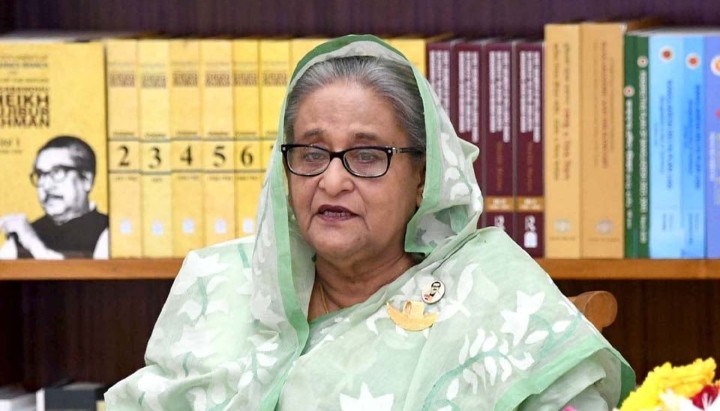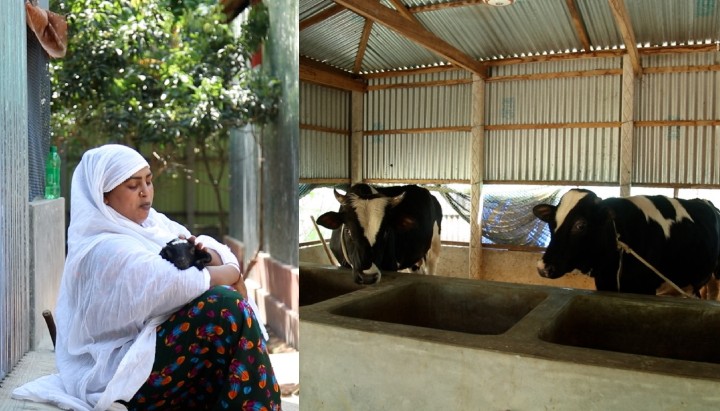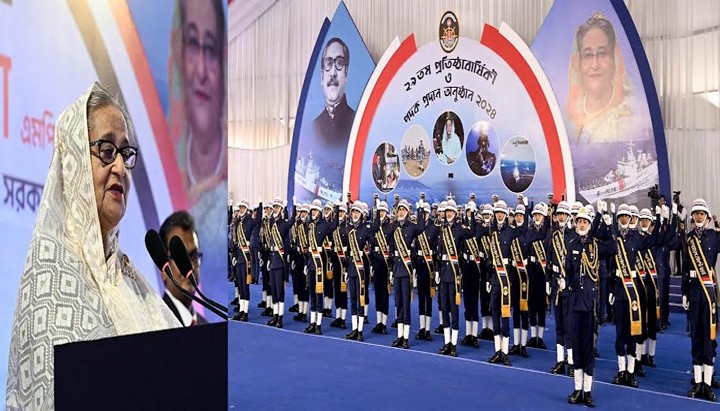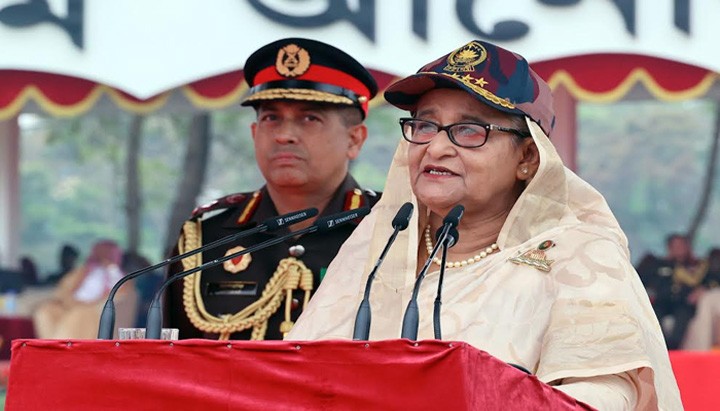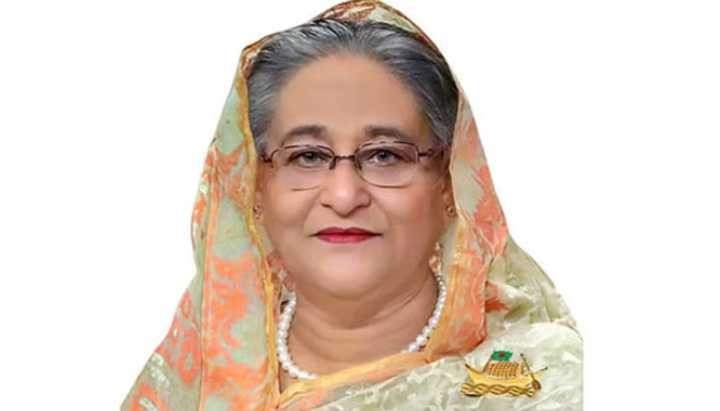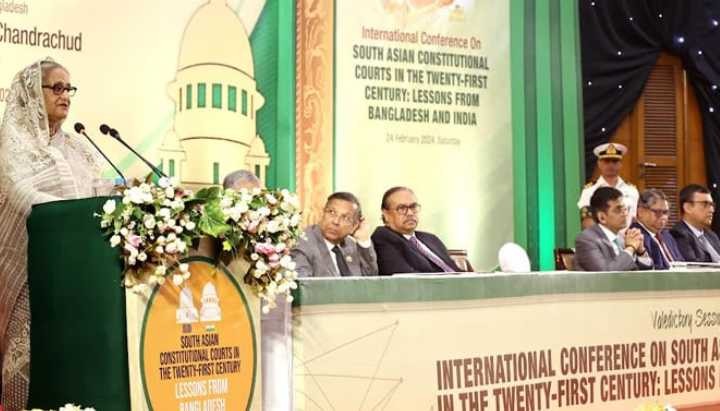Prime
Minister Sheikh Hasina today called Bangladesh as the most ideal place for
investment in the world, seeking larger foreign and local investment for mutual
benefit.
"Bangladesh
is the most ideal place for investment in the world as we offered maximum
investment opportunities. So, I hope overseas investment will come here and
local people will also invest in their own country," she said.
The prime
minister said this while inaugurating the formal operation of the Japanese
Economic Zone in the Bangladesh Special Economic Zone (BSEZ) at Araihazar in
Narayanganj district on the outskirts of the capital.
She joined
the function virtually from her official Ganabhaban residence here.
The
premier mentioned that Bangladesh could be a market of 300 crore people with 17
crore of its own, 50 crore in east, 150 crore in north and 50 crore in west due
to its geographical location.
The
different countries of the world can invest in Bangladesh largely to reap
benefits of the vast market, she added.
She also
said that her government has attached topmost priority to planned
industrialisation alongside agriculture by protecting the country's environment
and arable lands.
Sheikh
Hasina said her government is setting up 100 economic zones across the country
aimed at eliminating indiscriminate industrialisation and protecting arable
lands.
The
Japanese Economic Zone is being built on 1000 acres of land at Araihazar
Upazila in Narayanganj district of Bangladesh in line with an agreement signed
between the two countries during her Japan visit in 2014, she said.
The prime
minister said, "Foreign investment is coming to the economic zones.
Discussion is going on with India, China and Saudi Arabia (on setting up
economic zones in Bangladesh). Some other countries also expressed interest to
this end."
She
assured the interested countries, which wanted to build economic zones in
Bangladesh, of providing their desired places and said they can develop it as
per their need.
Bangladesh
is offering special opportunities for the investors, she said, adding that
foreign investors can use Chattogram, Mongla and Payra seaports and Matharbari
deep seaport for transportation of their produced goods.
The prime
minister said geographical location of Bangladesh is the most important for
investors as they can reach the markets with their products across the globe
while her country can make a bridge between East and West.
She
described various measures including enactment of investment friendly laws and
rules and special stimulus packages and loans for the investors.
Bangladeshi
youths can come forward to invest in the economic zones instead of running
after the jobs and generate huge employment for others, she said.
She added
that women also can invest in the economic zones as special arrangement has
been made to give them industrial plots here.
The prime
minister said her government has upgraded the road, rail, water and airways
with building new streets and railways alongside developing the waterways
through dredging to ensure easy and quick transportation of the goods produced
in the economic zones.
Describing
Japan as a true friend and development partner of Bangladesh, she said Japan is
currently helping the country in building metro rail, third terminal of
Shahjalal international airport, Dhaka and Matharbari deep seaport.
She also
recalled the Japanese cooperation in building the Rupsha Bridge and conducting
feasibility study of the Padma Bridge and Bangabandhu Bridge over the Jamuna
River.
"I am
extending my sincere thanks to Japan for staying beside Bangladesh
always," she added.
The prime
minister also recalled with due respect the contribution of late Japanese Prime
Minister Shinzo Abe to the overall development of Bangladesh describing him a
"true friend" and greeted the present Japanese Prime Minister also
for supporting her country.
She said
Father of the Nation Bangabandhu Sheikh Mujibur Rahman wanted to transform
Bangladesh into an industrialised country from an agriculture-based nation
following the footprints of Japan, she said.
The
premier said Bangabandhu had established Tejgaon industrial area and BSCIC
(Bangladesh Small and Cottage Industries Corporation) when he was the minister
during the Pakistan period.
After
coming to power in 1996, she said they have first set up economic processing
zone in Syedpur as there was no industry in the northern part of Bangladesh and
later built the economic zones at different parts of the country.
She said
she later thought to establish special economic zones across the country aimed
at stopping indiscriminate industrialisation and protecting the arable lands.
"We
have to save agriculture as Bangladesh is an agriculture based country. We have
to ensure food security for people, but we have to go for industrialisation
alongside the agriculture. So, I started to establish special economic zones
across the country in a planned way," she said.
Ambassador
of Japan to Bangladesh, ITO Naoki and President and Chief Executive Officer of
the Sumitomo Corporation Group, Masayuki Hyodo, spoke at function.
Executive
Chairman of Bangladesh Economic Zones Authority (BEZA) Shaikh Yusuf Harun gave
the address of welcome.
A video
documentary on activities of the Bangladesh Economic Zones was screened on the
occasion.
- BSS


